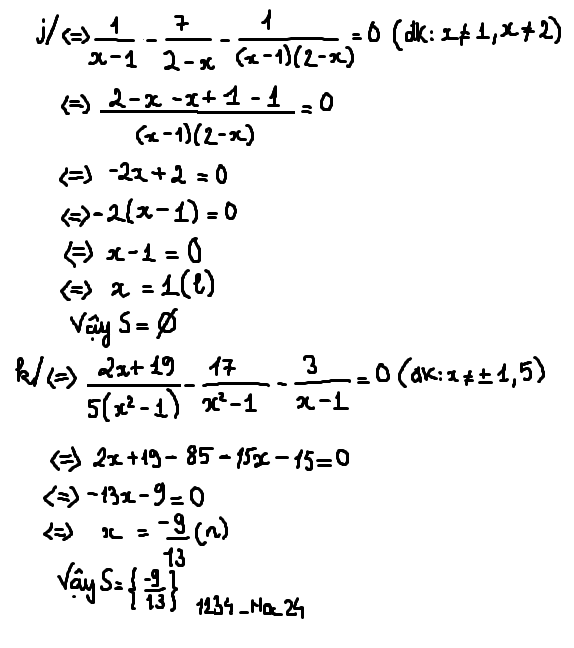Giải phương trình: \(\dfrac{x^2+1}{x} + \dfrac{x}{x^2+1}=\dfrac{5}{2} \)
Hãy nhập câu hỏi của bạn vào đây, nếu là tài khoản VIP, bạn sẽ được ưu tiên trả lời.


ĐKXĐ: \(x\ne\pm2\)
\(\dfrac{x+1}{x-2}-\dfrac{5}{x+2}=\dfrac{12}{x^2-4}+1\\ \Leftrightarrow\dfrac{\left(x+1\right)\left(x+2\right)}{\left(x-2\right)\left(x+2\right)}-\dfrac{5\left(x-2\right)}{\left(x+2\right)\left(x-2\right)}=\dfrac{12}{\left(x+2\right)\left(x-2\right)}+\dfrac{\left(x+2\right)\left(x-2\right)}{\left(x+2\right)\left(x-2\right)}\\ \Leftrightarrow\left(x+1\right)\left(x+2\right)-5\left(x-2\right)=12+\left(x+2\right)\left(x-2\right)\\ \Leftrightarrow x^2+x+2x+2-5x+10=12+x^2-4\\ \Leftrightarrow-2x=-4\\ \Leftrightarrow x=2\left(ktm\right)\)
Vậy \(S\in\left\{\varnothing\right\}\)
ĐKXĐ: \(\begin{cases}x-2\ne 0\\x+2\ne 0\end{cases}\leftrightarrow x\ne 2\\x\ne -2\end{cases}\)
\(\dfrac{x+1}{x-2}-\dfrac{5}{x+2}=\dfrac{12}{x^2-4}+1\)
\(\leftrightarrow \dfrac{(x+1)(x+2)}{(x-2)(x+2)}-\dfrac{5(x-2)}{(x+2)(x-2)}=\dfrac{12}{(x-2)(x+2)}+\dfrac{(x-2)(x+2)}{(x-2)(x+2)}\)
\(\to x^2+3x+2-5x+10=12+x^2-4\)
\(\leftrightarrow x^2-2x-x^2=12-12-4\)
\(\leftrightarrow -2x=-4\)
\(\leftrightarrow x=2(\rm KTM)\)
Vậy pt đã cho vô nghiệm \(S=\varnothing\)

TK
https://lazi.vn/edu/exercise/giai-phuong-trinh-4x-5-x-1-2-x-x-1-7-x-2-3-x-5
a: \(\Leftrightarrow4x-5=2x-2+x\)
=>4x-5=3x-2
=>x=3(nhận)
b: =>7x-35=3x+6
=>4x=41
hay x=41/4(nhận)
c: \(\Leftrightarrow\dfrac{14}{3\left(x-4\right)}-\dfrac{x+2}{x-4}=\dfrac{-3}{2\left(x-4\right)}-\dfrac{5}{6}\)
\(\Leftrightarrow\dfrac{28}{6\left(x-4\right)}-\dfrac{6\left(x+2\right)}{6\left(x-4\right)}=\dfrac{-9}{6\left(x-4\right)}-\dfrac{5\left(x-4\right)}{6\left(x-4\right)}\)
\(\Leftrightarrow28-6x-12=-9-5x+20\)
=>-6x+16=-5x+11
=>-x=-5
hay x=5(nhận)
d: \(\Leftrightarrow x^2+2x+1-\left(x^2-2x+1\right)=16\)
\(\Leftrightarrow4x=16\)
hay x=4(nhận)

a: =>10x=3(5-3x)
=>10x=15-9x
=>19x=15
=>x=15/19
b: =>\(\dfrac{x\left(x-4\right)+x^2-1}{x\left(x+1\right)}=2\)
=>2x^2+2x=x^2-4x+x^2-1=2x^2-4x-1
=>2x=-4x-1
=>6x=-1
=>x=-1/6
c:=>x(x+2)-x+2=2
=>x^2+2x-x=0
=>x(x+1)=0
=>x=0(loại) hoặc x=-1(nhận)
d: =>x+1+3x=2
=>4x=1
=>x=1/4
e: =>x(x+1)+x(x-3)=2x
=>x^2+x+x^2-3x=2x
=>2x^2-4x=0
=>x=0(nhận) hoặc x=2(nhận)
f: =>2x+6-4x+12=5
=>-2x=-13
=>x=13/2

a: ĐKXĐ: \(x\notin\left\{2;5\right\}\)
\(\dfrac{6x+1}{x^2-7x+10}+\dfrac{5}{x-2}=\dfrac{3}{x-5}\)
=>\(\dfrac{6x+1}{\left(x-2\right)\left(x-5\right)}+\dfrac{5}{x-2}=\dfrac{3}{x-5}\)
=>\(6x+1+5\left(x-5\right)=3\left(x-2\right)\)
=>6x+1+5x-25-3x+6=0
=>8x-18=0
=>8x=18
=>\(x=\dfrac{9}{4}\left(nhận\right)\)
b: Đề thiếu vế phải rồi bạn
c: ĐKXĐ: \(x\notin\left\{-1;3\right\}\)
\(\dfrac{1}{3-x}-\dfrac{1}{x+1}=\dfrac{x}{x-3}-\dfrac{\left(x-1\right)^2}{x^2-2x-3}\)
\(\Leftrightarrow\dfrac{-1}{x-3}-\dfrac{1}{x+1}-\dfrac{x}{x-3}=\dfrac{-\left(x-1\right)^2}{\left(x-3\right)\left(x+1\right)}\)
=>\(\dfrac{x+1}{x-3}+\dfrac{1}{x+1}=\dfrac{\left(x-1\right)^2}{\left(x-3\right)\left(x+1\right)}\)
=>\(\left(x+1\right)^2+x-3=\left(x-1\right)^2\)
=>\(x^2+2x+1+x-3=x^2-2x+1\)
=>\(3x-2=-2x+1\)
=>5x=3
=>\(x=\dfrac{3}{5}\left(nhận\right)\)

1: Ta có: \(\dfrac{5x^2-12}{x^2-1}+\dfrac{3}{x-1}=\dfrac{5x}{x+1}\)
\(\Leftrightarrow\dfrac{5x^2-12}{\left(x-1\right)\left(x+1\right)}+\dfrac{3x+3}{\left(x-1\right)\left(x+1\right)}=\dfrac{5x^2-5x}{\left(x+1\right)\left(x-1\right)}\)
Suy ra: \(5x^2+3x-9=5x^2-5x\)
\(\Leftrightarrow8x=9\)
hay \(x=\dfrac{9}{8}\left(tm\right)\)
2: Ta có: \(\dfrac{3}{x-5}-\dfrac{15-3x}{x^2-25}=\dfrac{3}{x+5}\)
\(\Leftrightarrow\dfrac{3x+15}{\left(x-5\right)\left(x+5\right)}+\dfrac{3x-15}{\left(x-5\right)\left(x+5\right)}=\dfrac{3x-15}{\left(x+5\right)\left(x-5\right)}\)
Suy ra: \(6x=3x-15\)
\(\Leftrightarrow3x=-15\)
hay \(x=-5\left(loại\right)\)
2. ĐKXĐ: $x\neq \pm 5$
PT \(\Leftrightarrow \frac{3}{x-5}+\frac{3x-15}{x^2-25}=\frac{3}{x+5}\)
\(\Leftrightarrow \frac{3}{x-5}+\frac{3(x-5)}{(x-5)(x+5)}=\frac{3}{x+5}\)
\(\Leftrightarrow \frac{3}{x-5}+\frac{3}{x+5}=\frac{3}{x+5}\Leftrightarrow \frac{3}{x-5}=0\) (vô lý)
Vậy pt vô nghiệm.

d: ĐKXĐ: \(x\notin\left\{2;-3\right\}\)
\(\dfrac{1}{x-2}-\dfrac{6}{x+3}=\dfrac{5}{6-x^2-x}\)
=>\(\dfrac{1}{x-2}-\dfrac{6}{x+3}=\dfrac{-5}{\left(x+3\right)\left(x-2\right)}\)
=>\(x+3-6\left(x-2\right)=-5\)
=>x+3-6x+12=-5
=>-5x+15=-5
=>-5x=-20
=>x=4(nhận)
e: ĐKXĐ: x<>-2
\(\dfrac{2}{x+2}-\dfrac{2x^2+16}{x^3+8}=\dfrac{5}{x^2-2x+4}\)
=>\(\dfrac{2}{x+2}-\dfrac{2x^2+16}{\left(x+2\right)\left(x^2-2x+4\right)}=\dfrac{5}{x^2-2x+4}\)
=>\(2\left(x^2-2x+4\right)-2x^2-16=5\left(x+2\right)\)
=>\(2x^2-4x+8-2x^2-16=5x+10\)
=>5x+10=-4x-8
=>9x=-18
=>x=-2(loại)
f: ĐKXĐ: \(x\in\left\{1;-1\right\}\)
\(\dfrac{x+1}{x^2+x+1}-\dfrac{x-1}{x^2-x+1}=\dfrac{2\left(x+2\right)^2}{x^6-1}\)
\(\Leftrightarrow\dfrac{x+1}{x^2+x+1}-\dfrac{x-1}{x^2-x+1}=\dfrac{2\left(x+2\right)^2}{\left(x-1\right)\left(x+1\right)\left(x^2+x+1\right)\left(x^2-x+1\right)}\)
=>\(\dfrac{\left(x+1\right)\left(x^2-x+1\right)\left(x^2-1\right)-\left(x-1\right)\left(x^2+x+1\right)\left(x^2-1\right)}{\left(x-1\right)\left(x+1\right)\left(x^2+x+1\right)\left(x^2-x+1\right)}=\dfrac{2\left(x+2\right)^2}{\left(x-1\right)\left(x+1\right)\left(x^2+x+1\right)\left(x^2-x+1\right)}\)
=>\(\left(x^3+1\right)\left(x^2-1\right)-\left(x^3-1\right)\left(x^2-1\right)=2\left(x^2+4x+4\right)\)
=>\(\left(x^2-1\right)\cdot\left(x^3+1-x^3+1\right)=2\left(x^2+4x+4\right)\)
=>\(2x^2+8x+8=\left(x^2-1\right)\cdot2=2x^2-2\)
=>8x=-10
=>x=-5/4(nhận)

1: Ta có: \(\dfrac{3}{x+2}-\dfrac{x-1}{x^2-4}=\dfrac{2}{x-2}\)
Suy ra: \(3x-6-x+1=2x+4\)
\(\Leftrightarrow2x-5=2x+4\left(vôlý\right)\)
2: Ta có: \(\dfrac{x-5}{2x-3}-\dfrac{x}{2x+3}=\dfrac{1-6x}{4x^2-9}\)
Suy ra: \(\left(x-5\right)\left(2x+3\right)-x\left(2x-3\right)=1-6x\)
\(\Leftrightarrow2x^2-7x-15-2x^2+6x+6x-1=0\)
\(\Leftrightarrow5x=16\)
hay \(x=\dfrac{16}{5}\)

=>(x^2+1)^2+x^2/x*(x^2+1)=5/2
=>\(\dfrac{\left(x^2+1\right)^2+x^2}{x\left(x^2+1\right)}=\dfrac{5}{2}\)
=>\(2\left(x^4+2x^2+1+x^2\right)=5\left(x^3+x\right)\)
=>2x^4+6x^2+2-5x^3-5x=0
=>2x^4-5x^3+6x^2-5x+2=0
=>2x^4-2x^3-3x^3+3x^2+3x^2-3x-2x+2=0
=>(x-1)(2x^3-3x^2+3x-2)=0
=>(x-1)(2x^3-2x^2-x^2+x+2x-2)=0
=>(x-1)^2*(2x^2-x+2)=0
=>x-1=0
=>x=1